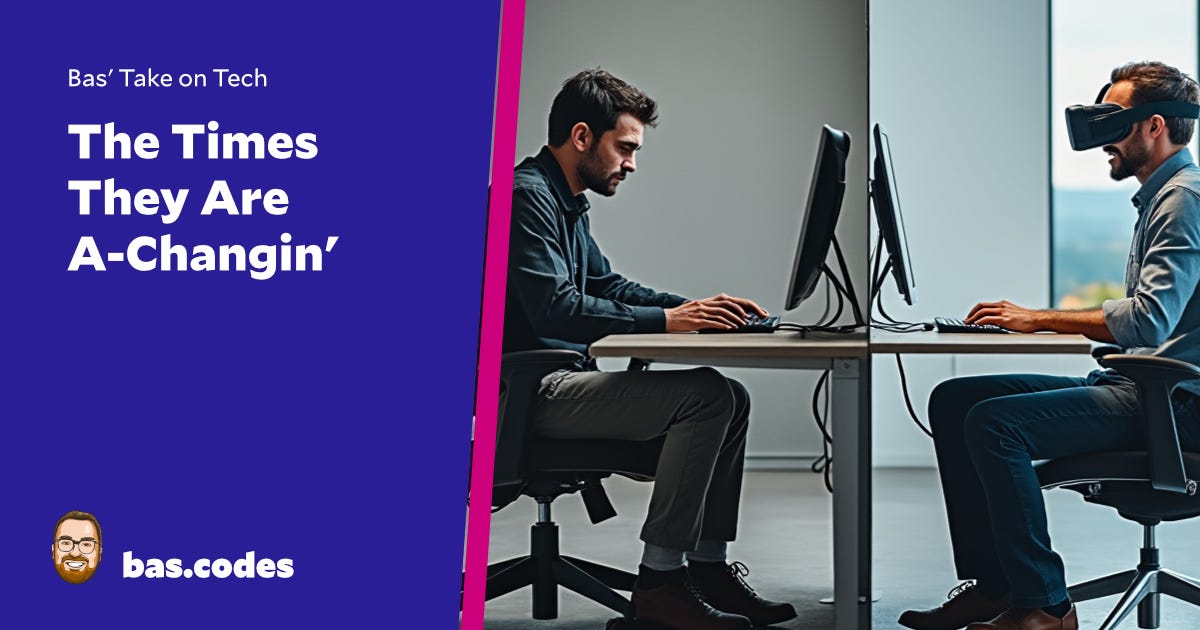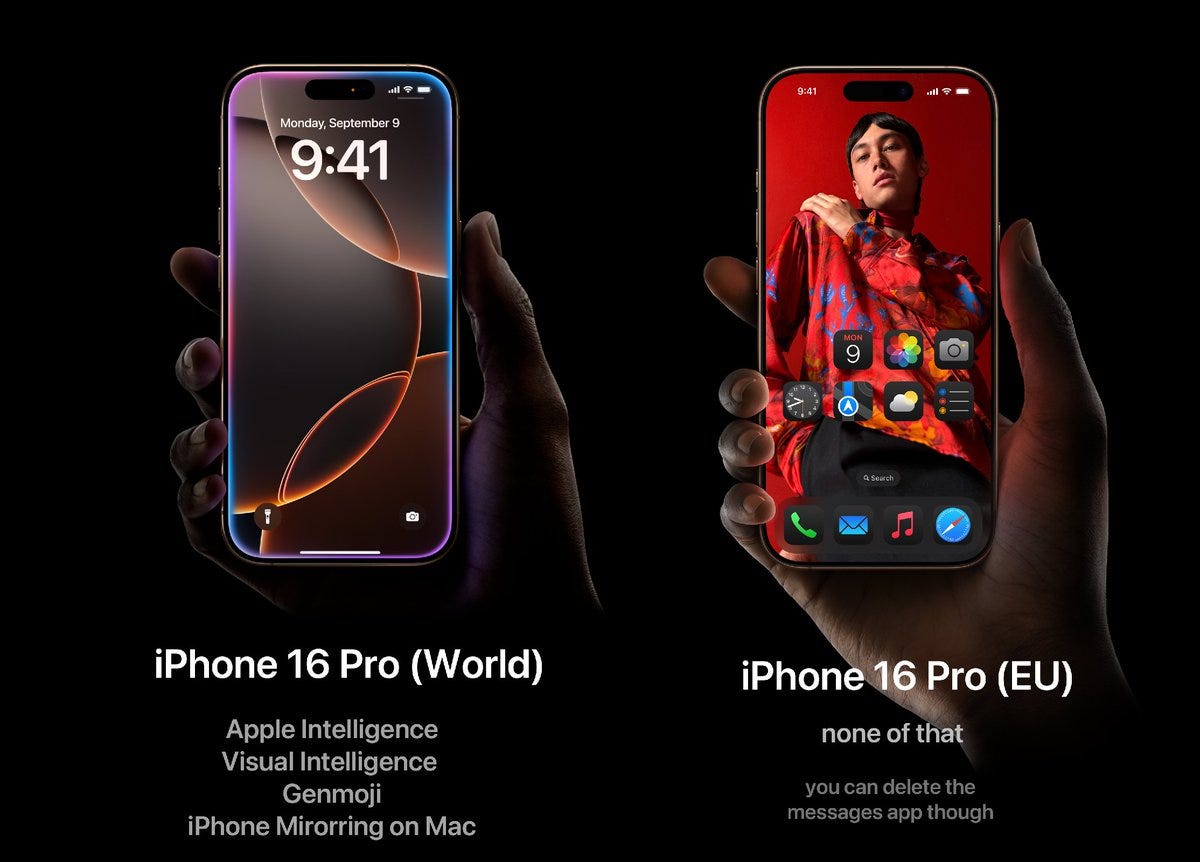Bas' Take on Tech: The Times They Are A-Changin’
Hi there,
thanks for reading my tech newsletter about the recent buzz in tech.
Have a great week ahead!
🧑⚖️ The Times They Are A-Changin’
Apple held their keynote yesterday. As an Apple fan, these keynotes have not been the same since Steve Jobs passed and certainly not since they’re not live, anymore after Covid. The rhetoric, mimic and gestures of the Apple managers are so streamlined, impersonal and lacking originality that in combination with the same bullshit bingo phrases repeated year after year become so boring. Yes, I know that this is the slimmest gadget you ever produced and despite encouraging people to buy a new one every year, this one is bazillion times less impactful to the planet. “Corporate Memphis”, an attempt not to offend anyone, so as not to step on anyone's toes and drown any originality in soulless arbitrariness, is so clearly visible that the whole prerecorded presentation might as well be completely AI-generated.
But that’s not my point. Beyond the rehearsed speeches and shiny gadgets, two announcements stood out to me: Sleep apnoea detection on the Apple Watch, and hearing tests in a software update for the AirPods Pro 2. Both features are healthcare related, and thus, highly regulated. It’s no coincidence that Apple awaits approval from the FDA (USA), and regulatory bodies in Germany and Japan – covering three continents, each with the strictest regulation in place. If you can make it there, you can make it anywhere.
At the same time, they announced some expected, yet impressive features for “Apple Intelligence” which they interestingly refer to as “Machine Learning”, not so much as AI.
Barely any of those features are available in the EU. But you can delete the messages app and install Fortnite. Whether this is the result of intentional malicious compliance with EU regulations or EU regulations being so strict that even Apple cannot handle it, doesn’t even matter at this point.
What’s important, is that the future of tech – like anything else – is not in the hands of engineers but of bureaucrats and corporate lawyers more than ever.
Forgotten are the times when nerds could pursue their passion and change the world with simple tools and a soldering iron or keyboard, unchallenged by unsuspecting functionaries and profiteers. If you’re nostalgic, there are two books that offer a glimpse into that era and remind us of what's at stake:
Fire in the Valley by Michael Swaine
How the Internet Happened by Brian McCullough
I mentioned it last week: A risk in tech is not whether AI replaces software development jobs, but rather whether AI is accessible and affordable for “indie” developers and teams. Rumours are that OpenAI’s next models could cost $2,000 per month.
This trend is concerning. As AI becomes less accessible (due to higher prices or stricter regulation) to indie developers and small teams, we risk seeing a future where the barrier to entry into tech markets is unbearably high. The creativity that once defined the tech landscape could give way to monopolized, corporate-driven progress.
It’s a similar story with the cloud: You’re tricked into thinking you “need” scalability, when you don’t. Once locked in, it’s payday. On Vercel, for example, Pieter Levels would pay $35,000 a month. Or, as DHH puts it: “You don't have much need for auto-scaling when compute is cheap. It's a cloud solution to a cloud problem. When you own your own cores, you just get enough that it doesn't require constant monitoring”.
As the iPhone demonstrates, AI and tech regulation are becoming inseparable, and the days of unfettered innovation by passionate nerds may be slipping away, replaced by the dictates of bureaucrats and lawyers. The question is no longer whether AI will change the world, but whether we’ll still have room to shape it ourselves.
📰 Interesting Reads
Everyone assumes it's game over, but Intel's huge bet on 18A is still very much game on
This German startup is Europe’s best hope for developing AI advancement outside Silicon Valley
Prediction: Microsoft Azure To Reach $200 Billion In Revenue By 2028
🐍 Web Scraping With Python And Scrapy
I’m excited to announce today's release of my brand-new, first-of-its-kind miniguide on Web Scraping with Python and Scrapy, and guess what? It's completely free, courtesy of ScraperAPI! Whether you're new to scraping or just looking to sharpen your skills, this guide will walk you through everything you need to know to start collecting data from the web like a pro. Think of all the possibilities—tracking prices, gathering leads, or even doing a bit of market research. And here's the best part: download the miniguide now, and you'll snag 10% off on all ScraperAPI services. Happy scraping!
🚀 What else?
I have changed this newsletter from “occasional” to at least once every two weeks. The new format not only contains curated news and insights from the tech world but also sets the stage for fellow developers.
I will ask people about their journeys in the tech world and also in life. I’m pretty sure there is much to learn from listening to other people’s experiences, and I am excited to share that with you!
Of course, I need your help with this.
Please tell me if you want to share your story with my 600+ readers!
What is something you learned?
What are some books that recently influenced you?
What do you want to share with others about your life, your productivity, your career, and your health?
Reach out to me on this form.
Let me know how I can make the newsletter better.
I set up a short feedback form here.
It would mean the world to me if you spent a minute or two filling it out!
Best,



